SOLONEX DT 100MG TABLET
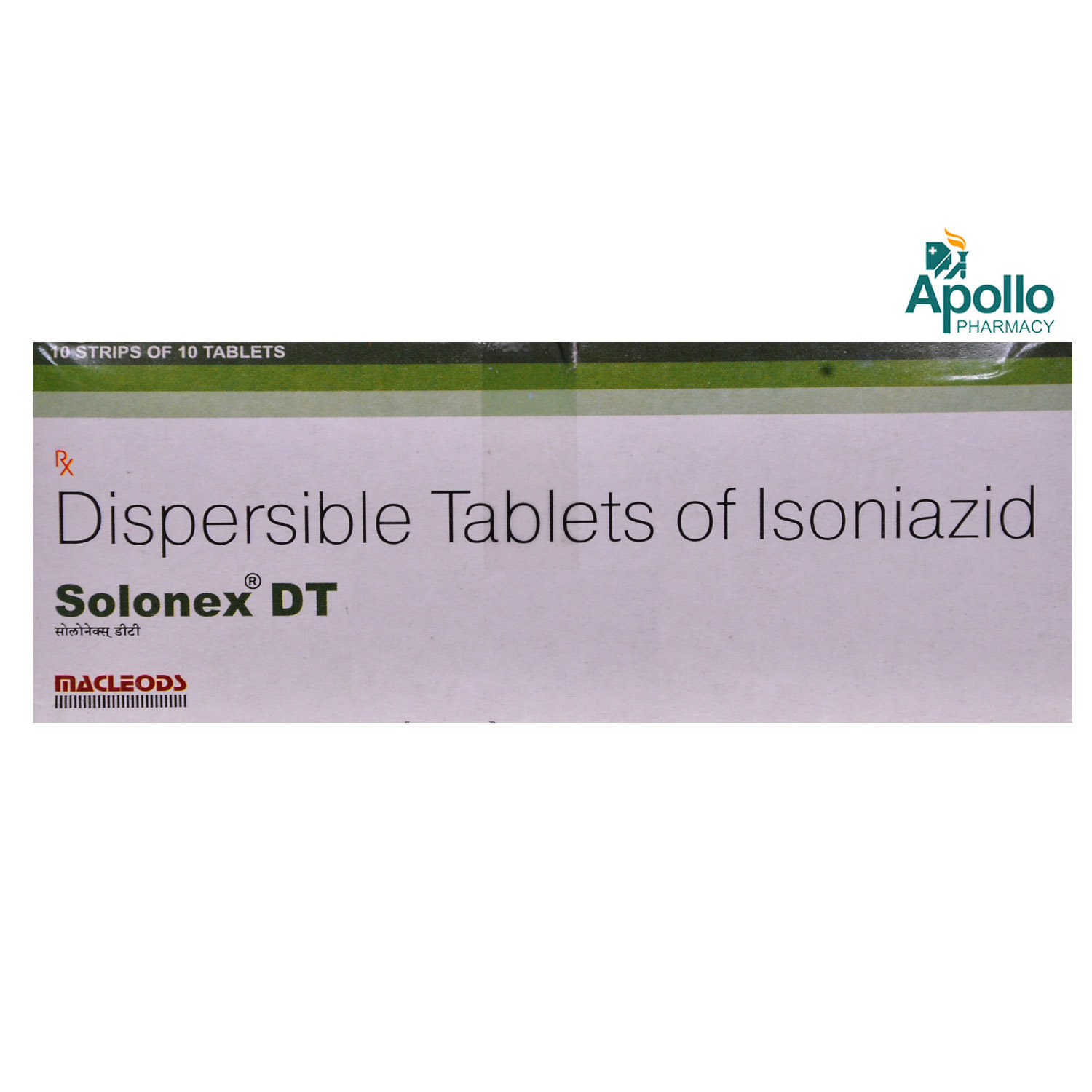
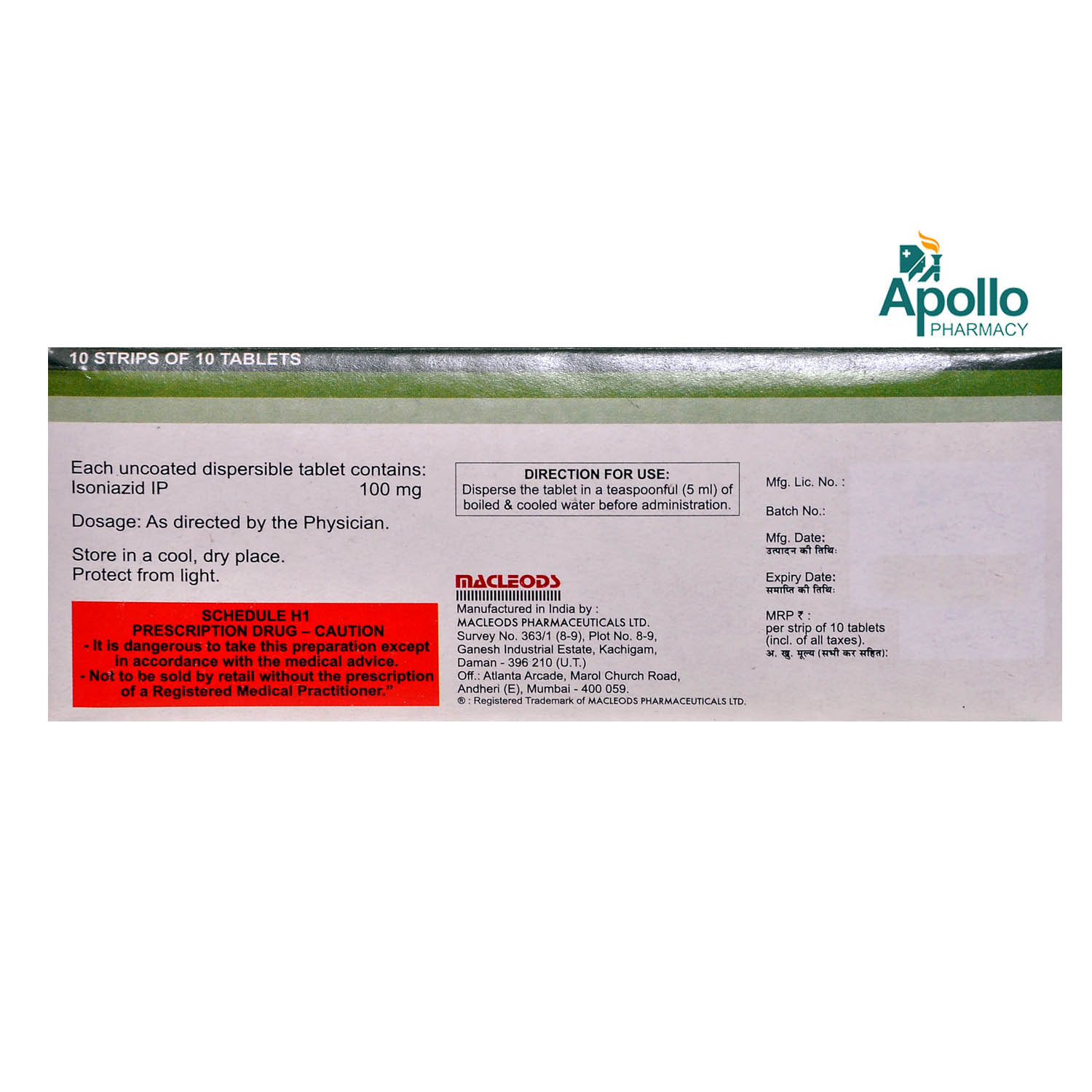
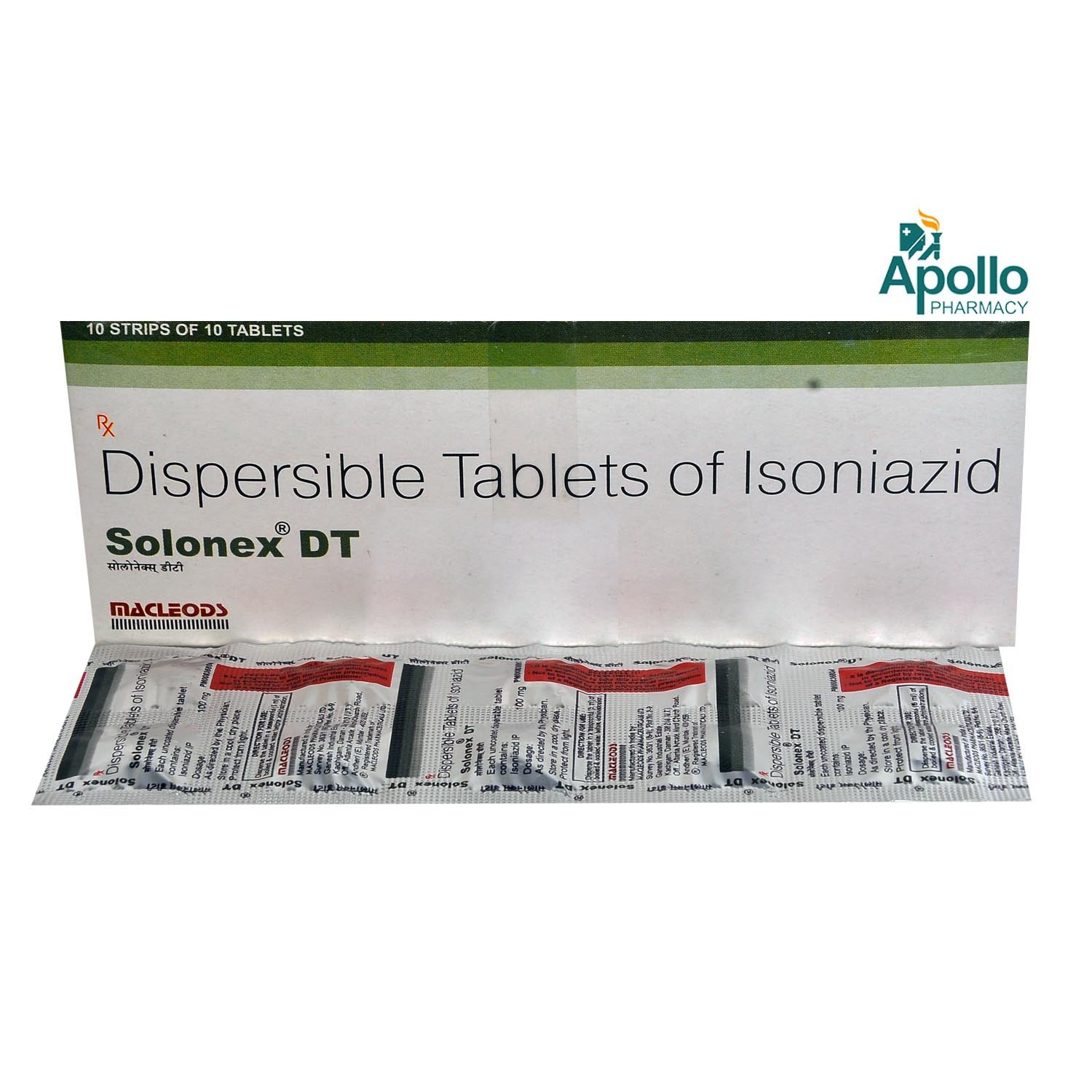
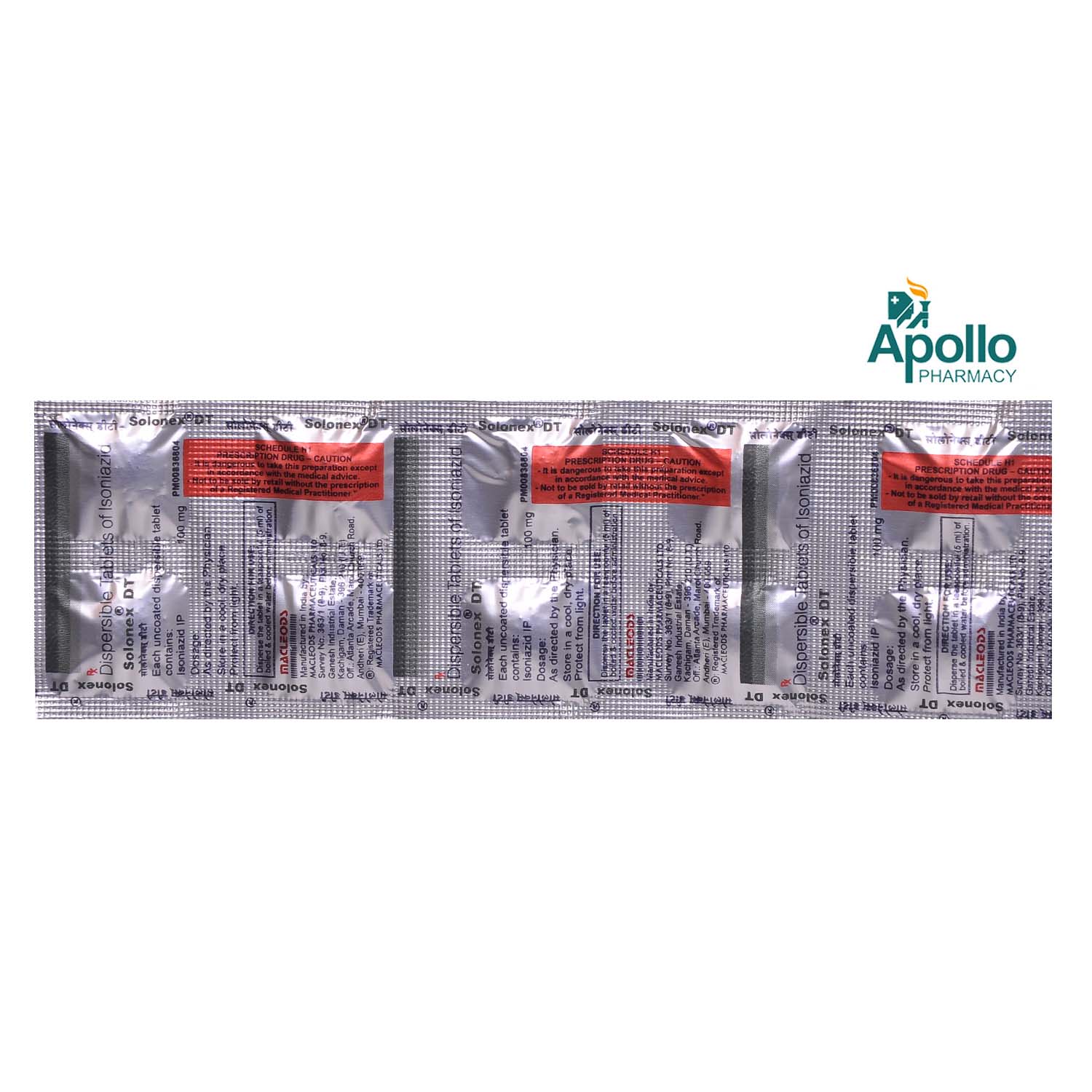
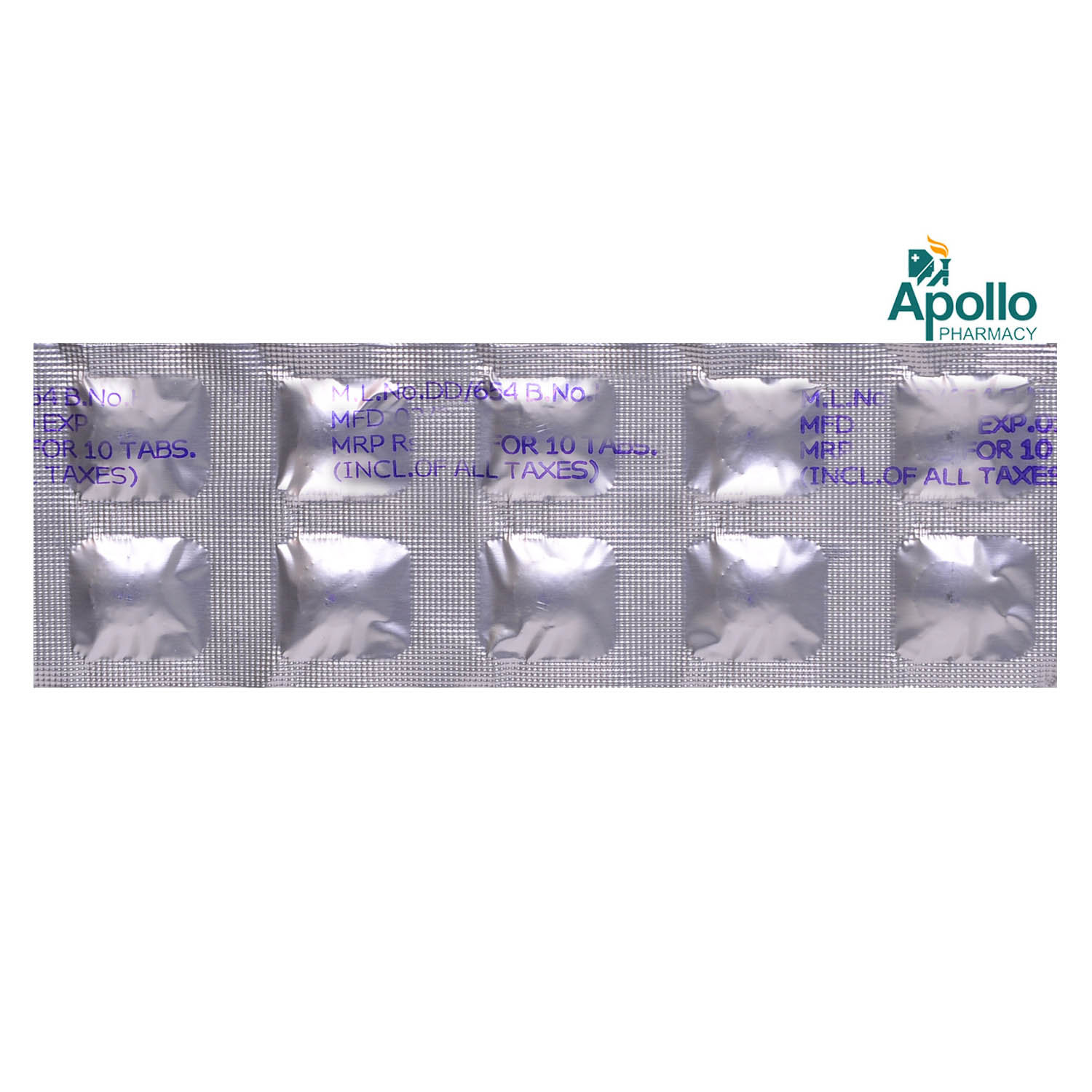





MRP ₹7.5
(Inclusive of all Taxes)
₹1.1 Cashback (15%)
Provide Delivery Location
Online payment accepted
 Prescription drug
Prescription drugWhats That
Composition :
Manufacturer/Marketer :
Consume Type :
Expires on or after :
Return Policy :
About SOLONEX DT 100MG TABLET
SOLONEX DT 100MG TABLET belongs to the group of medicines called anti-tubercular agents primarily used to treat and prevent tuberculosis (TB). Tuberculosis is an infectious bacterial disease that mainly affects the lungs, but it can also spread to other body parts such as the kidneys, brain, spine, and bone marrow. SOLONEX DT 100MG TABLET does not work against infections caused by the virus.
SOLONEX DT 100MG TABLET contains isoniazid, an antibiotic that works by preventing bacteria from producing mycolic acids, an enzyme required for cell wall formation (protective coating). As a result of the disturbance in their metabolism, bacteria that lack a cell wall die and burst. Thus, SOLONEX DT 100MG TABLET inhibits the spread of infection by acting against the bacteria Mycobacterium tuberculosis, which causes tuberculosis.
Take SOLONEX DT 100MG TABLET as prescribed. Use SOLONEX DT 100MG TABLET for as long as your doctor has prescribed it based on your medical condition. In some cases, you may experience fever, dizziness, nausea, stomach upset, loss of appetite, constipation, tiredness, numbness, or tingling in the feet or hands as side effects of SOLONEX DT 100MG TABLET. Most of these side effects do not require medical attention and gradually resolve over time. However, if any of these side effects persist or worsen, please consult your doctor.
If you are allergic to SOLONEX DT 100MG TABLET or any other medicines, please tell your doctor. If you are pregnant or breastfeeding, please inform your doctor before taking SOLONEX DT 100MG TABLET. SOLONEX DT 100MG TABLET may cause mental health problems, fits, or optic neuritis (swelling of the optic nerve that may cause vision loss) in some people. Therefore, avoid driving if you experience any of these symptoms after taking SOLONEX DT 100MG TABLET. Avoid foods and drinks containing histamine or tyramine such as cured meat, matured cheese, soya, tuna, salmon, mackerel, wine, and beer while on treatment with SOLONEX DT 100MG TABLET as they might interact with this medicine. If you have fits, diabetes, HIV infection, malnutrition, kidney or liver problems, or have suffered from psychosis (mental disturbances), inform your doctor before taking SOLONEX DT 100MG TABLET.
Uses of SOLONEX DT 100MG TABLET
Directions for Use
Key Benefits
SOLONEX DT 100MG TABLET contains isoniazid, an antibiotic used to treat and prevent tuberculosis. SOLONEX DT 100MG TABLET prevents bacteria from producing mycolic acids, which are required for the formation of cell walls (protective coating). Additionally, SOLONEX DT 100MG TABLET may combine with an enzyme that interferes with bacterial cell metabolism. Bacteria die as a result of the disruption in their metabolism and the lack of a cell wall. As a result, it kills Mycobacterium tuberculosis bacteria that causes tuberculosis (TB) and eliminates the infection.
Storage
Drug Warnings
If you are known to be allergic to SOLONEX DT 100MG TABLET, please inform your doctor. If you are pregnant or breastfeeding, please inform your doctor before taking SOLONEX DT 100MG TABLET. SOLONEX DT 100MG TABLET may cause mental health problems, fits or optic neuritis (swelling of the optic nerve that may cause vision loss) in some people. Therefore, avoid driving if you experience any of these symptoms after taking SOLONEX DT 100MG TABLET. Avoid foods and drinks containing a high level of tyramine, such as fermented foods, cheese, cured meat, soya, tuna, salmon, mackerel, wine, and beer, while taking SOLONEX DT 100MG TABLET as they might cause drug-food interaction. Avoid alcohol consumption with SOLONEX DT 100MG TABLET as it may cause liver damage. If you have fits, diabetes, HIV infection, malnutrition, kidney or liver problems or have suffered from psychosis (mental disturbances), inform your doctor before taking SOLONEX DT 100MG TABLET.
Drug-Drug Interactions
Drug-Drug Interactions
Login/Sign Up
When Solonex Dt 100mg Tablet is taken with Regorafenib, it can increase the levels of Regorafenib leading to side effects.
How to manage the interaction:
Taking Regorafenib with Solonex Dt 100mg Tablet is not recommended, it taken can be taken if prescribed by the doctor.
When Lomitapide is taken with Solonex Dt 100mg Tablet, Solonex Dt 100mg Tablet may increase the blood levels of lomitapide which leads to side effects.
How to manage the interaction:
Taking Solonex Dt 100mg Tablet with Lomitapide is not recommended but can be taken if prescribed by a doctor. However, if you experience fever, chills, joint pain or swelling, unusual bleeding or bruising, skin rash, itching, exhaustion, nausea, vomiting, dark urine, light stools, and skin or eye yellowing, decreased hunger, consult the doctor.
When Lovastatin is taken with Solonex Dt 100mg Tablet, can increase the risk of myopathy (muscles problems), including rhabdomyolysis (a condition that causes your muscles to break down, which leads to muscle death).
How to manage the interaction:
Taking Solonex Dt 100mg Tablet with Lovastatin is not recommended but can be taken if a doctor has prescribed it.
Using Solonex Dt 100mg Tablet with Teriflunomide can increase the risk and severity of the side effects of the liver.
How to manage the interaction:
Taking Solonex Dt 100mg Tablet with Teriflunomide together can possibly result in an interaction, but it can be taken if a doctor has advised it. If you have any of these symptoms, it's important to consult a doctor: Fever, chills, joint pain or swelling, unusual bleeding or bruising, skin rash, itching, loss of appetite, nausea, vomiting, abdominal pain, dark urine, light colored stool, and/or yellowing of the skin or eyes. Do not stop using any medications without talking to a doctor.
The combined use of Solonex Dt 100mg Tablet and Simvastatin will enhance the levels of Simvastatin, which increases the risk of side effects.
How to manage the interaction:
Co-administration of Simvastatin and Solonex Dt 100mg Tablet can lead to an interaction, it can be taken if advised by a doctor. However, if you experience any unusual symptoms, consult the doctor. Do not stop using any medications without a doctor's advice.
Co-administration of Solonex Dt 100mg Tablet may considerably enhance the blood levels of Tizanidine, which may result in side effects.
How to manage the interaction:
There may be a possibility of interaction between Tizanidine and Solonex Dt 100mg Tablet, but it can be taken if prescribed by a doctor. However, consult a doctor if you experience excessive drowsiness, dizziness, lightheadedness, fainting, and irregular heart rhythm. Do not stop taking any medications without consulting a doctor.
When Omeprazole is taken with Solonex Dt 100mg Tablet, it can increase the risk of side effects.
How to manage the interaction:
Co-administration of Omeprazole with Solonex Dt 100mg Tablet can result in an interaction, but it can be taken if a doctor has advised it. However, if you experience any unusual symptoms, consult the doctor. Do not stop using any medications without talking to a doctor.
The combined use of Solonex Dt 100mg Tablet and Sonidegib will enhance the amount of Sonidegib, which increases the risk of side effects.
How to manage the interaction:
Although there is a possible interaction between Sonidegib and Solonex Dt 100mg Tablet, you can take these medicines together if prescribed by a doctor. Do not stop using any medications without a doctor's advice.
Using Phenytoin together with Solonex Dt 100mg Tablet may increase the effects of Phenytoin, which may increase the risk of side effects.
How to manage the interaction:
Although taking Phenytoin and Solonex Dt 100mg Tablet together can result in an interaction, it can be taken if a doctor has prescribed it. However, if you experience jerky eye movements, slurred speech, loss of balance, shaking, muscle stiffness or weakness, nausea, vomiting, feeling dizzy, fainting, and slow or shallow breathing, consult a doctor immediately. Do not discontinue the medications without consulting a doctor.
Co-administration of lemborexant and Solonex Dt 100mg Tablet may increase the blood levels of lemborexant. This may increase the risk of side effects.
How to manage the interaction:
There may be a possibility of interaction between Lemborexant and Solonex Dt 100mg Tablet, but it can be taken if prescribed by a doctor. However, if you experience depression, abnormal sleep behaviors, worsening of depression or suicidal thoughts, changes in heartbeat, or headache. Do not discontinue any medications without a doctor's advice.
Drug-Food Interactions
Drug-Food Interactions
Login/Sign Up
Diet & Lifestyle Advise
- Pineapple juice might help soothe the symptoms of cough and cold. It also has anti-inflammatory and mucolytic properties.
- Vitamin C-rich foods such as kiwi, broccoli, and bell pepper help in improving the immune system.
- Avoid processed and fried foods.
- Warm ginger tea or warm soup can help in providing relief from a cough.
- Avoid foods and drinks containing histamine or tyramine such as cured meat, matured cheese, soya, tuna, salmon, mackerel, wine, and beer.
- Quit smoking and avoid alcohol consumption.
Side Effects of SOLONEX DT 100MG TABLET
- Fever
- Dizziness
- Nausea
- Stomach upset
- Loss of appetite
- Constipation
- Tiredness
- Numbness or tingling in the feet or hands
Habit Forming
Therapeutic Class
All Substitutes & Brand Comparisons
Author Details
We provide you with authentic, trustworthy and relevant information
Drug-Diseases Interactions
Drug-Diseases Interactions
Login/Sign Up
FAQs
SOLONEX DT 100MG TABLET contains isoniazid, an antibiotic used to treat and prevent tuberculosis. SOLONEX DT 100MG TABLET prevents bacteria from producing mycolic acids, which are required for the formation of cell walls (protective coating). Additionally, SOLONEX DT 100MG TABLET may combine with an enzyme that interferes with bacterial cell metabolism. Bacteria die as a result of the disruption in their metabolism and the lack of a cell wall. As a result, it kills Mycobacterium tuberculosis bacteria that causes tuberculosis (TB) and eliminates the infection.
It is not recommended to take SOLONEX DT 100MG TABLET with food. You are advised to take SOLONEX DT 100MG TABLET on an empty stomach at least 1 hour before a meal or 2 hours after a meal for better absorption.
You are recommended to avoid foods and drinks containing histamine or tyramine such as cured meat, matured cheese, soya, tuna, salmon, mackerel, wine, and beer as they may interact with SOLONEX DT 100MG TABLET and cause adverse effects such as sweating, headache, dizziness, light-headedness, flushing (reddening of the skin), fainting due to low blood pressure, uneven, fast or forceful heartbeat.
Yes, SOLONEX DT 100MG TABLET may cause liver problems in some patients. However, please consult your doctor if you notice symptoms such as yellowing of eyes or skin, dark urine, pale stools, weakness, loss of appetite, nausea or vomiting. Your doctor may monitor your liver function while on treatment with SOLONEX DT 100MG TABLET.
You are advised to consult a doctor before taking phenytoin with SOLONEX DT 100MG TABLET as taking these medicines together may increase the levels of phenytoin in the blood and cause toxic effects. However, if you experience dizziness, vomiting, confusion or nausea, please consult your doctor.
Please do not stop taking SOLONEX DT 100MG TABLET suddenly without consulting your doctor as it may cause withdrawal symptoms such as irritation, nervousness, difficulty in sleeping, headache or having more dreams. Therefore, take SOLONEX DT 100MG TABLET for as long as your doctor has prescribed it, and if you experience any difficulty while taking SOLONEX DT 100MG TABLET, please consult your doctor.
SOLONEX DT 100MG TABLET is not recommended for patients suffering from fits as it may increase the risk of recurring fits. Therefore, it is advised to inform your doctor if you have a history of fits before taking SOLONEX DT 100MG TABLET.
Drug-Drug Interactions Checker List
- CARBAMAZEPINE
- THEOPHYLLINE
- PREDNISOLONE
- PHENOBARBITAL
- VALPROIC ACID
- FLURAZEPAM
- TRIAZOLAM
- DIAZEPAM
- WARFARIN
- PHENINDIONE
- PROCAINAMIDE
- ALFENTANIL
- MIDAZOLAM
- HALOPERIDOL
- CHLORPROMAZINE
- PARACETAMOL
- PHENYTOIN
- KETOCONAZOLE
Special Advise
- Your doctor may advise you to get regular blood tests while taking SOLONEX DT 100MG TABLET to monitor your liver function.
- Consult a pulmonologist or lung specialist if you have had a bad cough for 3 weeks or longer, chest pain, coughing up blood or sputum from deep inside the lungs.
-
A monthly liver function test is advisable while using SOLONEX DT 100MG TABLET.
Disease/Condition Glossary
Tuberculosis (TB): It is an infectious bacterial disease that affects the lungs, but it could also spread to other body parts such as the kidneys, brain, spine, and bone marrow. Tuberculosis is caused by a bacteria named Mycobacterium tuberculosis. It is a contagious disease that can spread to others through small droplets released into the air by a person suffering from tuberculosis. Symptoms include a cough that lasts for a few weeks, pain while coughing or normal breathing, unexplained fatigue, fever, night sweats, loss of appetite, and weight. People who smoke or consume alcohol, people diagnosed with HIV, and immune system problems are more likely at risk of developing active TB.

Have a query?
Buy best Infections & Infestation products by
Cipla Ltd
Macleods Pharmaceuticals Ltd
Alkem Laboratories Ltd
Lupin Ltd
Abbott India Ltd
Sun Pharmaceutical Industries Ltd
Mankind Pharma Pvt Ltd
Micro Labs Ltd
Aristo Pharmaceuticals Pvt Ltd
FDC Ltd
Intas Pharmaceuticals Ltd
Glenmark Pharmaceuticals Ltd
Ipca Laboratories Ltd
Torrent Pharmaceuticals Ltd
Zydus Healthcare Ltd
Biochem Pharmaceutical Industries Ltd
Zuventus Healthcare Ltd
United Biotech Pvt Ltd
Hetero Drugs Ltd
Emcure Pharmaceuticals Ltd
Alembic Pharmaceuticals Ltd
Indoco Remedies Ltd
Fusion Health Care Pvt Ltd
Dr Reddy's Laboratories Ltd
Leeford Healthcare Ltd
Cadila Healthcare Ltd
Wockhardt Ltd
Zydus Cadila
GlaxoSmithKline Pharmaceuticals Ltd
Morepen Laboratories Ltd
Blue Cross Laboratories Pvt Ltd
Cadila Pharmaceuticals Ltd
Converge Biotech Pvt Ltd
Elder Pharmaceuticals Ltd
Hetero Healthcare Pvt Ltd
Pfizer Ltd
AAA Pharma Trade Pvt Ltd
Gufic Bioscience Ltd
Mylan Pharmaceuticals Pvt Ltd
Corona Remedies Pvt Ltd
Wallace Pharmaceuticals Pvt Ltd
Apex Laboratories Pvt Ltd
Medishri Healthcare Pvt Ltd
Akumentis Healthcare Ltd
Alniche Life Sciences Pvt Ltd
Hegde & Hegde Pharmaceutica Llp
Veritaz Healthcare Ltd
Ranbaxy Laboratories Ltd
Koye Pharmaceuticals Pvt Ltd
Shreya Life Sciences Pvt Ltd
Overseas Health Care Pvt Ltd
Biocon Ltd
Indchemie Health Specialities Pvt Ltd
Medley Pharmaceuticals Ltd
Brinton Pharmaceuticals Ltd
J B Chemicals & Pharmaceuticals Ltd
Unifaith Biotech Pvt Ltd
Ajanta Pharma Ltd
Biochemix Health Care Pvt Ltd
Natco Pharma Ltd
Samarth Life Sciences Pvt Ltd
Unichem International
Laborate Pharmaceuticals India Ltd
Unipark Biotech Pvt Ltd
Zymes Bioscience Pvt Ltd
Indiabulls Pharmaceuticals Pvt Ltd
Neon Laboratories Ltd
Vasu Organics Pvt Ltd
DR Johns Lab Pharma Pvt Ltd
East West Pharma India Pvt Ltd
La Renon Healthcare Pvt Ltd
Medgen Drugs And Laboratories Pvt Ltd
Novartis India Ltd
Canixa Life Sciences Pvt Ltd
Icarus Health Care Pvt Ltd
Lincoln Pharmaceuticals Ltd
Celon Laboratories Pvt Ltd
Concept Pharmaceuticals Ltd
Klm Laboratories Pvt Ltd
Nicholas Piramal India Ltd
Systopic Laboratories Pvt Ltd
Yuventis Pharmaceuticals
Capital Pharma
German Remedies Ltd
Pristine Pearl Pharma Pvt Ltd
Unison Pharmaceuticals Pvt Ltd
Aurz Pharmaceutical Pvt Ltd
Clover Health Care Pharma
Kepler Healthcare Pvt Ltd
Allites Life Sciences Pvt Ltd
Auspharma Pvt Ltd
Intra Life Pvt Ltd
Jolly Healthcare
Linux Laboratories Pvt Ltd
Ozone Pharmaceuticals Ltd
Cachet Pharmaceuticals Pvt Ltd
Comed Chemicals Ltd
Delcure Life Sciences Ltd
Fresenius Kabi India Pvt Ltd
Khandelwal Laboratories Pvt Ltd
Alcohol
Safe if prescribed
Avoid alcohol consumption while on treatment with SOLONEX DT 100MG TABLET as it may increase the risk of liver damage. Please consult your doctor in case of any concerns.
Pregnancy
Consult your doctor
If you are pregnant, consult your doctor before taking SOLONEX DT 100MG TABLET. Your doctor may prescribe this medicine if only the benefits outweigh the risks.
Breast Feeding
Consult your doctor
SOLONEX DT 100MG TABLET is excreted in breast milk in low quantities. If you are breastfeeding, consult your doctor before taking SOLONEX DT 100MG TABLET. Your doctor may prescribe this medicine if only the benefits outweigh the risks.
Driving
Safe if prescribed
SOLONEX DT 100MG TABLET may cause mental health problems, fits or optic neuritis (swelling of the optic nerve that may cause vision loss) in some people. Therefore, avoid driving if you experience any of these symptoms after taking SOLONEX DT 100MG TABLET.
Liver
Consult your doctor
Take SOLONEX DT 100MG TABLET with caution, especially if you have a history of Liver diseases/conditions. Your doctor may adjust the dose of this medicine or prescribe a suitable alternative based on your condition.
Kidney
Consult your doctor
Take SOLONEX DT 100MG TABLET with caution, especially if you have a history of Kidney diseases/conditions. Your doctor may adjust the dose of this medicine or prescribe a suitable alternative based on your condition.
Children
Safe if prescribed
SOLONEX DT 100MG TABLET is not recommended for children below 3 months of age. However, in children above 3 months, SOLONEX DT 100MG TABLET should be used under medical supervision.





